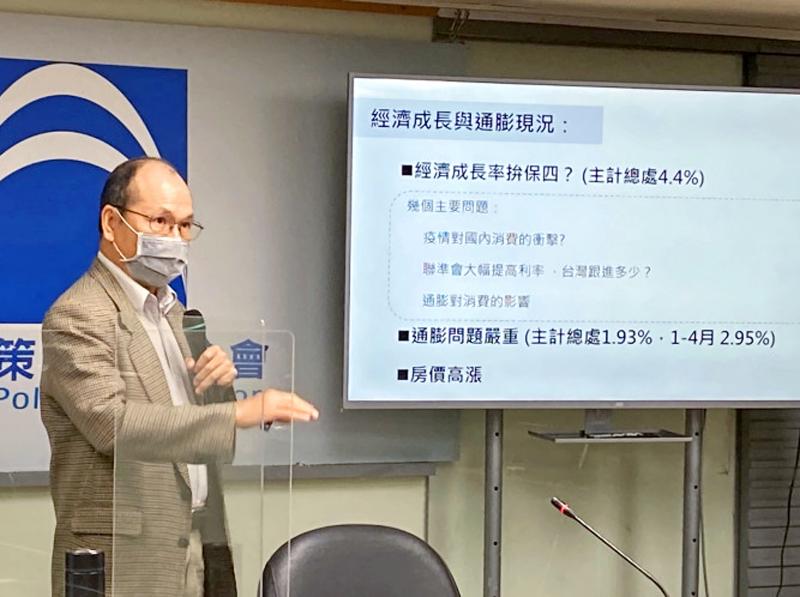Inflation could cause Taiwan’s GDP growth to drop below 4 percent this year, or 0.4 percentage points than the government’s forecast, the Chinese Nationalist Party (KMT)-aligned National Policy Foundation said yesterday.
The party-affiliated think tank made the comment at a news conference that highlighted inflation and energy issues on the sixth anniversary of President Tsai Ing-wen’s (蔡英文) administration.
Lin Chu-chia (林祖嘉), the think tank’s economic and fiscal policy convener, said that the COVID-19 pandemic, the central bank’s interest rate hike and inflation would likely have a cooling effect on economic growth.

Photo courtesy of the National Policy Foundation
The consumer price index last month showed a year-on-year increase of 3.38 percent, while greater price increases were reported for some essential goods, he said.
The price of eggs soared 24.39 percent and the cost of restaurant meals increased 5.56 percent, he said, citing two examples.
The Tsai administration’s policy to eliminate nuclear energy by 2025 was not accompanied by a corresponding increase in renewable energy, which reported sluggish growth over the past five years, he said.
This has resulted in an unstable energy supply along with increased reliance on coal-fired power plants, which has triggered more frequent and longer power outages, he said.
Citing a poll the think tank released on Friday last week, Lin said that 62 percent of Taiwanese disapproved of Tsai’s handling of the economy, 60.6 percent said that large-scale blackouts would occur in the next two years and 53.8 percent said that the energy supply was unstable.
“The Democratic Progressive Party’s government’s [green energy] obsession is getting in the way of Taiwan’s economy and public health,” KMT Legislator Wu I-ding (吳怡玎) said.
The government did not have a clear path to a net zero emissions goal, despite the creation of programs the would cost an estimated NT$900 billion (US$30.35 billion) by 2030, she said.
Regarding the Environmental Protection Administration’s carbon tax scheme, Wu said that the tax rates were too low to have an effect on emissions, and that officials have erred in exempting the power generation sector from the tax.
The government should have worked on developing clean energy alternatives instead of shifting costs to energy consumers such as manufacturers and households, she said.
Additionally, the Tsai administration’s investment in solar energy and energy storage technologies has not led to results that are commensurate to costs, Wu said.
Taiwanese wages declined by 0.004 percent last year, and real wages have been stagnant since 2002, KMT Legislator Hsieh Yi-fong (謝衣鳳) said, citing Executive Yuan data.
The central bank’s decision to raise interest rates — coinciding with the shortening of mortgage payment periods from 40 years to 20 years — has significantly increased economic pressure on young people, she said.
The government’s rent subsidies also misfired, as officials failed to anticipate that the benefits would be claimed by landlords illegally subletting property and not by tenants, as intended, she said.
Additional reporting by CNA

South Korean K-pop girl group Blackpink are to make Kaohsiung the first stop on their Asia tour when they perform at Kaohsiung National Stadium on Oct. 18 and 19, the event organizer said yesterday. The upcoming performances will also make Blackpink the first girl group ever to perform twice at the stadium. It will be the group’s third visit to Taiwan to stage a concert. The last time Blackpink held a concert in the city was in March 2023. Their first concert in Taiwan was on March 3, 2019, at NTSU Arena (Linkou Arena). The group’s 2022-2023 “Born Pink” tour set a

CPBL players, cheerleaders and officials pose at a news conference in Taipei yesterday announcing the upcoming All-Star Game. This year’s CPBL All-Star Weekend is to be held at the Taipei Dome on July 19 and 20.

The Taiwan High Court yesterday upheld a lower court’s decision that ruled in favor of former president Tsai Ing-wen (蔡英文) regarding the legitimacy of her doctoral degree. The issue surrounding Tsai’s academic credentials was raised by former political talk show host Dennis Peng (彭文正) in a Facebook post in June 2019, when Tsai was seeking re-election. Peng has repeatedly accused Tsai of never completing her doctoral dissertation to get a doctoral degree in law from the London School of Economics and Political Science (LSE) in 1984. He subsequently filed a declaratory action charging that

The Hualien Branch of the High Court today sentenced the main suspect in the 2021 fatal derailment of the Taroko Express to 12 years and six months in jail in the second trial of the suspect for his role in Taiwan’s deadliest train crash. Lee Yi-hsiang (李義祥), the driver of a crane truck that fell onto the tracks and which the the Taiwan Railways Administration's (TRA) train crashed into in an accident that killed 49 people and injured 200, was sentenced to seven years and 10 months in the first trial by the Hualien District Court in 2022. Hoa Van Hao, a